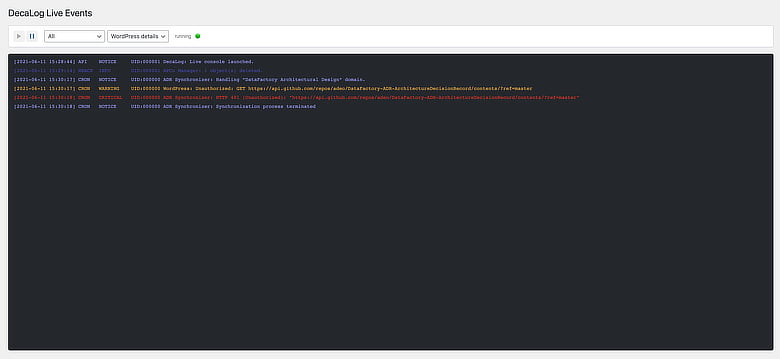DecaLog
De-facto standard stack for WordPress observability.
WordPress Observability Foundations
Reliable and powerful logging, monitoring and tracing for WordPress core, PHP, database, plugins and themes.
DecaLog captures events generated by WordPress core, PHP, database, plugins and themes, collates metrics and KPIs and follows traces of the full WordPress execution. It has the ability to enrich these events, metrics and traces with many details regarding their triggering, before storing them in WordPress database or passing them to external services.
If you don’t want to use external services, DecaLog provides the tools to leverage all the benefits of observability right in the WordPress admin dashboard. It supports multisite logs delegation and contains many features to help to protect personal information (user pseudonymization, IP obfuscation, etc.).
DecaLog can be used in dev/debug phases or on production sites: it has nearly no resource impact on the server. It provides an extensive set of WP-CLI commands to help operations too.
If you are a themes or plugin developper, DecaLog comes with a complete SDK.
Multisite Delegation
On WordPress multisite, Network Admins can configure the plugin and have access to all events and traces. Sites Admins have access to the events and traces of their own sites.
DecaLog includes a large number of connectors allowing you to consider all cases of storage, filtering and sending. Whether it’s for the cloud, on an on-premise platform or on a simple personal NAS, you will find a match:
Google Cloud Logging
Send events to Google Cloud Logging (formerly Stackdriver) via a Google-Fluentd collector.
WordPress
Get events and traces stored in WordPress database and explorable right in the admin dashboard.
PHP Error Log
Store events in the standard PHP error log, like with the error_log() function, but much more detailed.
Rotating Files
Store events in files that are rotated every day and a limited number of files are kept.
Made For WordPress
Single-site / Multisite WordPress compatibility.
Privacy features for handled PII. No cookie set.
Extensive set of WP-CLI commands.
Consistent user interface.
Installation right from the official WordPress directory.
Optional and free CDN to serve resource files.
Contribution
Do you want to make DecaLog a better plugin or improve WordPress observability? Whether you are a developer or not, you can help me to do it...
Support & Help
I?ll be glad to help you if you encounter issues with DecaLog. Just use the support section of the WordPress directory.







